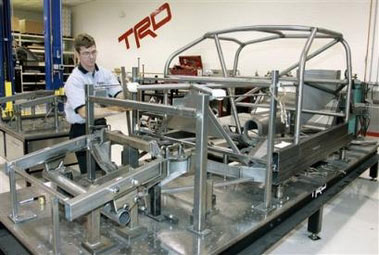Toyota, on course to overtake General Motors as the world's biggest
automaker, is well behind in the world's fastest-growing market - and one
where GM is thriving: China.

Gene
Watson works on a Car of Tomorrow chassis for a Toyota Camry NASCAR Nextel
Cup car at the Toyota Research and Development facility in High Point,
N.C., May 9, 2006. Toyota hopes to take a key step toward catching up
when it rolls out its first made-in-China Camry, the best-selling model in
the United States. [AP Photo] |
But on
Tuesday, Toyota hopes to take a key step toward catching up when it rolls out
its first made-in-China Camry, the best-selling model in the United States.
The launch, from Toyota's new 3.8 billion yuan (US$475 million) factory in
Nansha, near the southern city of Guangzhou, symbolizes the automaker's newfound
ambitions for China, which is about to surpass Japan as the world's
second-largest auto market.
Virtually unscathed by political frictions between the two countries, Toyota
and fellow Japanese automakers Honda Motor Co. and Nissan Motor Co., are pushing
ahead with billions of dollars in new investments.
Toyota Motor Corp., a relative latecomer to China, has a paltry 3.5 percent
of the market, with 179,000 vehicles sold last year.
That puts it well behind top foreign automaker General Motors Corp., which
captured 11 percent of the market last year with 665,390 units sold, and
Volkswagen AG of Germany, the No. 2 foreign maker.
The Camry was the lead import model in China over the last 10 years, selling
20,000 to 30,000 annually during that time, according to Yale Zhang, an auto
market specialist for consulting firm CSM Asia Corp. in Shanghai. By shifting
production to China, where consumers are closer, Toyota hopes to double its
Camry sales to 60,000 by year-end.
Toyota is betting that - as in the United States - the reliable,
mid-sized sedan will spearhead its growth in China, helping it reach 1 million
units in sales, or a projected 10 percent of the market, by 2010.
"We are confident that the Camry is a good fit for the Chinese market,"
Toyota Motor Corp. President Katsuaki Watanabe told The Associated Press this
past week at a Tokyo reception for auto executives.
GM spokesman Dee Allen said the company is aware of Toyota's plans in China
and sees the Japanese company as a tough competitor in any market.
"But we have a multi-brand strategy in China - with Wuling, Chevrolet,
Buick, Cadillac and Saab - and our business results there have been very
good. We've seen double-digit growth and we continue to expand," Allen said on
Friday.
"I don't know that this is so much a case of GM defending its position as it
is one of Toyota establishing one," he said.
Chinese consumers seem largely unaffected by ongoing tension between the
Beijing and Tokyo over a range of issues, including Japanese Prime Minister
Junichiro Koizumi's repeated visits to a Tokyo shrine that honors the dead of
World War II, including war criminals.
Brand reputation trumps politics, says Zhang Xin, an auto industry analyst at
Guotai Junan Securities.
"What customers care about is quality and price," Zhang says. "Japanese cars
are economical, not gas-guzzlers. And their appearance appeals to us; perhaps
because we are all Asians we have something in common in terms of aesthetics."
With China's sizzling economy and swelling middle class, the auto market grew
30 percent last year to 5.7 million vehicle sales, according to local industry
figures, just behind Japan's 5.8 million. US auto sales totaled 17.4 million
last year.
That business potential is not lost on Japanese auto industry, which invested
a total of 113.7 billion yen (US$1.03 billion) in China last year, according to
Japan's Ministry of Finance, more than any other sector.
Japan's No. 3 automaker, Honda, which began making Accords in the southern
city of Guangzhou in 1999, launched exports of its Jazz compact model to Europe
a year ago.
Toyota first started exporting Crowns to China in 1964, and began nurturing
partnerships with Chinese vehicle makers as early as the late 1970s, but then
turned its attention to the US and European markets.
It cautiously held back in China in the 1980s while Western automakers like
Germany's Volkswagen AG plunged in, only launching its first Toyota-branded car
from its joint venture with First Auto Works (FAW), based in Changchun, in the
northeast in 2002.
Toyota has since made China a pillar of its global strategy, cultivating
relations with its partners in Tianjin, near Beijing, and Guangzhou, in the
south, buying up engine plants and other suppliers and enticing Japanese
suppliers to shift operations to China.
The company has invested a total of 215 billion yen ($1.94 billion) since
1998 in China and now has a dozen plants making parts and assembling vehicles.
To oversee its push into China, Toyota last year appointed Yoshimi Inaba,
former head of its American operations.
And to help contain costs, Toyota plans to buy most parts for the Camry
locally, with half coming from the region near Guangzhou. Its engine plant there
is already exporting engines for Camrys built in Japan and the US.
The Camry will be produced in Toyota's newest plant, a joint venture with
Guangzhou Automobile Industrial Group in Nansha, a port city 40 miles north of
Hong Kong on the Pearl River.
That southern region around Guangzhou has become an offshore Japanese car
manufacturing hub that is challenging Shanghai's self-designated status as
China's auto city, with Toyota, Nissan and Honda all building up joint ventures,
accompanied by dozens if not hundreds of parts suppliers.
"All the Japanese cars are selling really well," says Zhang of CSM Asia.
Like many analysts, he believes Toyota's late start is not much of a handicap
given the company's strong reputation for quality and its systematic approach to
acquiring market share.
"Toyota will jump to No. 2 if not No. 1," he says.